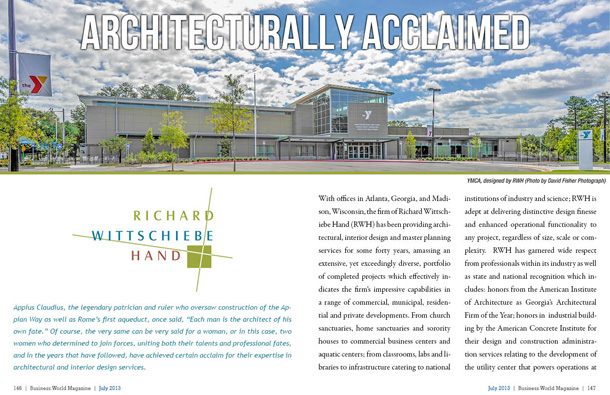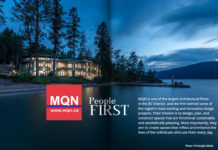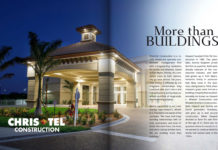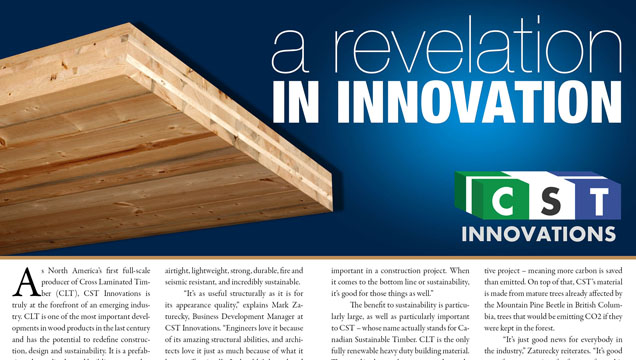
Architecturally Acclaimed

Appius Claudius, the legendary patrician and ruler who oversaw construction of the Appian Way as well as Rome’s first aqueduct, once said, “Each man is the architect of his own fate.†Of course, the very same can be very said for a woman, or in this case, two women who determined to join forces, uniting both their talents and professional fates, and in the years that have followed, have achieved certain acclaim for their expertise in architectural and interior design services.
With offices in Atlanta, Georgia, and Madison, Wisconsin, the firm of Richard Wittschiebe Hand (RWH) has been providing architectural, interior design and master planning services for some forty years, amassing an extensive, yet exceedingly diverse, portfolio of completed projects which effectively indicates the firm’s impressive capabilities in a range of commercial, municipal, residential and private developments. From church sanctuaries, home sanctuaries and sorority houses to commercial business centers and aquatic centers; from classrooms, labs and libraries to infrastructure catering to national institutions of industry and science; RWH is adept at delivering distinctive design finesse and enhanced operational functionality to any project, regardless of size, scale or complexity. RWH has garnered wide respect from professionals within its industry as well as state and national recognition which includes: honors from the American Institute of Architecture as Georgia’s Architectural Firm of the Year; honors in industrial building by the American Concrete Institute for their design and construction administration services relating to the development of the utility center that powers operations at The Center for Disease Control and Prevention; and awards for innovation by the Georgia State University Board of Regents for the firm’s architectural and interior design of a new student dining center. RWH services also complement the concourses and the international travelers’ club at Hartsfield-Jackson Atlanta International Airport, the parking decks serving staff at BellSouth Telecommunications, the reading spaces of the Martin Luther King, Jr. Library, worship spaces at Congregation Beth Jacob, Dunwoody Community Church and Faith Lutheran Church, while also adding certain refinement to the revelry resonating within fraternity houses affiliated with Phi Gamma Delta, Lambda Chi Alpha and Sigma Nu. These are but a few examples which help reflect the diversity of projects completed by RWH.
What also sets RWH apart from other firms is the fact that it is one of the few in the trade owned and operated by a woman, actually two women, in Carol Richard and Janice Wittschiebe. After forming a partnership more than 20 years ago, Richard and Wittschiebe went on to merge with another respected architect in Peter Hand (especially known for his designs involving aquatic centers). As Hand is semi-retired and said to be primarily focused on “pet-projects,†the company continues to be led by Richard and Wittschiebe. For all of the firm’s success, there is certain irony in the fact that Founder Carol Richard had once planned to enter an entirely separate profession.
Back in the early 1980’s, both Richard and Wittschiebe worked at separate architectural firms, an experience that Richard recalls as somewhat “disillusioning†in terms of expectations she had after completing university studies and entering the business. Wanting to have greater creative autonomy and flexibility with her time schedule, Richard parted ways with large firm and established her own. Hers was among the earliest of woman-owned architectural firms in Georgia, but Richard says her professional plans were more focused on going into medicine. Her architectural work was viewed as a means to pay for her studies in pre-med, and she had actually been accepted into medical school when she decided to evoke what has been said to be a woman’s prerogative – she changed her mind.
Richard says the reverse of course was largely prompted by her joy of interacting with clients, solving complex challenges and using her creative talents to bring concepts into life, in measures that often exceeded client expectations. She found someone of like perspective in Janice Wittschiebe, and both became familiar with one another through their participation in an organization comprised by women who worked in the trade. Their relationship, however, blossomed after they both found themselves on a team tasked with preparations involving Atlanta’s 1996 staging of the Summer Olympics. Long before the leaping of any long jump or the hurdling of any hurdle, architects, builders, engineers and planners met to strategize the development of infrastructure necessary for the event. Richard and Wittschiebe were tasked with ascertaining and identifying all aspects of building codes and zoning regulations that could potentially impact development of needed sports facilities and playing fields – an Olympic-sized undertaking. Wittschiebe explains, “Our job was finding out where there might be any roadblocks to development. We did all the preliminary work which provided the jump-start for the work done by the design team.†Yet, as Richard says, this work turned out to be serendipitous for both. They quickly discovered that the skills and approach to duties not only gelled, but complemented the respective strengths of each. They ultimately decided to form a partnership and have never looked back.
Sustainably Stylish
While both Wittschiebe and Richard refer to themselves as “generalists†as opposed to specialists in only one type of architectural aesthetic, their firm has, nonetheless, become specialists in LEED-certified services; projects that distinctively adhere to Leadership in Energy and Environmental Design-standards espoused by the U.S. Green Building Council. RWH actually provided the services in a project that earned recognition as one of the first LEED Platinum projects in Atlanta; services which involved renovation of the training center, technical library and offices at the headquarters of the American Society of Heating, Refrigerating, and Air-Conditioning Engineers. Wittschiebe says they are especially proud to have worked on this project, not only because of what they were able to deliver, but because securing the contract meant competing against much larger and established firms. More recently, RWH has provided interior design, critical to the development of new lecture halls, faculty offices, classrooms and more at Gwinnett Technical College in Lawrenceville, Georgia, a project that will ultimately qualify for LEED-Silver certification. This college is one of a number of academic institutions which has been served by RWH. Wittschiebe credits a longstanding, collaborative relationship with the visionary Board of Regents that oversee the state’s university system as one of the most important relationships of her firm. She says the relationship has been fostered by her firm’s ability to work in a team approach with the Board of Regents, a process that requires extensive input and recommendations from diverse teams charged with oversight, and adhering to budgetary restraints without forsaking on the quality or functionality desired for the completed project. “Everyone one has certain expectations and requirements, but that is part of what makes it so enjoyable, to work with so many people in process … but thankfully, they will also let you stretch on design as long as you can do it on budget,†says Wittschiebe.
Design aesthetic and environmental sustainability are equal areas of focus for RWH, and reflect both professional and personal concerns of Richard and Wittschiebe. As Richard says, they’re particularly attracted to projects which take environmental sensitivity and energy efficiency into account. And while LEED certification is typically only associated with commercial and municipal development, RWH has incorporated those same standards in residential development. Even Richard’s home in Madison, Wisconsin, has secured LEED Platinum certification (the first in the state of Wisconsin).
Family Friendly
In accounting of the offices opened in Wisconsin, Richard provides insight which may further speak to the values that separate this firm from others. Despite being full-time, engaged professionals (which includes Wittschiebe’s role as the current President of AIA in Georgia), neither are so caught-up in business dealings as to lose sight of the importance of family. The need to provide care for a frail step mother basically prompted Richard to relocate to Wisconsin, yet she still finds time to commute to Georgia.
Beyond this, and despite all of the firm’s work in commercial, educational and municipal infrastructure, Wittschiebe says they particularly enjoy working with families on residential projects. She says these require a differing degree of trust. “To effectively design and construct a home, in a way that makes sense for a family, you’re asking the client to reveal their inner workings… you have to take awareness of how a family operates and incorporate that into the design… that requires a higher level of trust than other projects,†says Wittschiebe.
Trust, no doubt, figures in all of RWH’s work, and that’s made clear as both share their perspective as to how their small, but capable firm, has secured contracts with some fairly substantial forces of industry. Their talent for teaming, for collaborating as opposed to dominating in group settings; their ability to listen as effectively as they offer input; their passionate attention to little details in form, color and texture; these are all hallmarks of what is often described as a woman’s touch, but are also elements of the practices perfected by RWH.
This is a firm that places great emphasis on accountability, trust and commitment to relationships, but to be sure, those values are not only underscored in its relationship with clients, but also within its inner operations. In fact, for the last three years, RWH has been conferred with honors as an outstanding IDP firm; recognition of its training, mentoring and best practices involving intern development programs.
Both Richard and Wittschiebe have also taken time to participate in a variety of charity events and mentoring programs which have put them square and center in front of a group of school children. Both agree that it is important for young girls to understand that architecture represents a meaningful career alternative, which may not always be at the forefront of their considerations. As important as it may be for girls to understand that professional opportunities exist for women, Wittschiebe says, “It is also important for young boys to realize that too.â€
In terms of the future, Richard says RWH will continue to be drawn toward projects that are not only design intense, but those that foster teamwork, promote sustainability and pose challenges that will enable her team to effectively demonstrate the range of the company’s service capabilities. As Richard says, “For us, the focus has always been more about the people we’re working with as opposed to the project… it’s never been about the end-design, but understanding what the client needs and wants, and then, incorporating that into the design and bringing it to life.†In so doing, as Wittschiebe affirms, “We can accomplish anything.â€
For more information, please visit their website at: Â Richard Wittschiebe Hand







